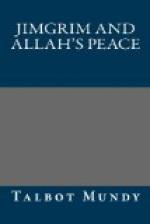“Hssh!”
“Hah! All the same, I would not choose to be Noureddin’s enemy.”
“There is another one who will share that opinion—or so I have heard. I was told that Bedreddin Shah, a recent recruit in the police, stumbled by accident on certain evidence and demanded a huge sum for silence. Hee-hee! How much will anybody give Bedreddin Shah for his prospect?”
“Hssh!”
“What did Bedreddin Shah discover?”
“Nobody knows.”
“You mean nobody will tell.”
“The same thing.”
“How long could a secret be kept in Jerusalem, if you people were informed of what is going on? You are good for propaganda, that is all! You can talk—Allah! how you all talk! But as for doing anything, or keeping a secret until a thing is done, you are no better than magpies.”
The last speaker was a rather fat man, over in the corner by the scullery door. He had a nose like Sultan Abdul Hamid’s and large, elongated eyes that looked capable of seeing things on either side of him while he stared straight forward. Even in that dark corner you could see they had the alligator-hue that one associates with cruelty. He had the massive shoulders and forward-stooping position as he sat cross-legged on the seat that suggest deliberate purpose devoid of hurry.
They all resented what he said, but none seemed disposed to quarrel with him. One or two remonstrated mildly, but he ignored their remarks, busying himself with digging out a cigarette from a gold case set with jewels; after he had lighted it very thoughtfully and examined the end once or twice to make sure that it burned just right, he let it hang between his lips in a way that accentuated the angle of his bulbous nose. You wondered whether he owned a harem, and what the ladies thought of him.
“Will you sit and brag in here all day?” he asked after a few minutes. “Yussuf must be getting rich, you sip so much coffee. It is not particularly good for Yussuf to get rich; it will make him lazy, as most of you are.”
The chattering had ceased, although there were several attempts to break that uncomfortable silence with inane remarks. His ravenish, unpleasant voice seemed to act on the company like a chill wind, depriving treason of its warm sociableness but leaving in the sting.
“I said you are good for propaganda,” he resumed, tossing away ash with a reflective air. “But even that has no value within four walls. If Noureddin Ali should come and learn from me how much talking has been done in here, and how little done outside, I can imagine he will not be pleased. Are there no other kahawi?* Why is that story about the Zionists and their offer to buy the Dome of Rock not being spread diligently? You like the safety of this place with its four thick walls. But I tell you the jackal has to leave his hole to hunt.” [Coffee-shops]
They did not like taking orders, even when they were expressed more or less indirectly; no follower of the new political freedom does like it, for it rather upsets the new conceit. But he evidently knew his politicians, and they him. They got up one by one and made for the door, each offering a different excuse designed to cover up obedience under a cloak of snappy independence. Not one of them drew a retort from him, or as much as a farewell nod.




